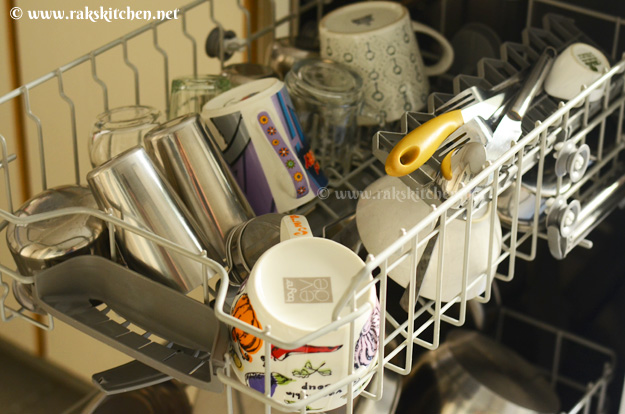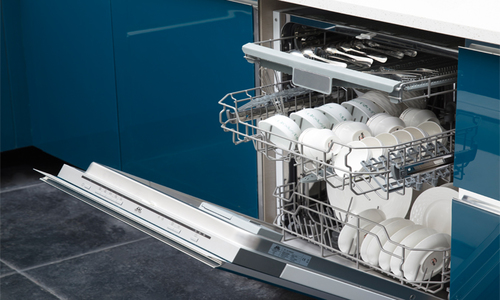A dishwasher can be quite effective in an Indian kitchen, especially for handling heavily soiled pots and pans. Many modern dishwashers come with advanced settings tailored for intense cleaning.
Dishwashers in Indian kitchens are increasingly popular, offering convenience and efficiency that cater to the demanding cookware involved in Indian cooking. Traditionally, Indian cuisine involves the use of various spices and oils, which can leave stubborn residue on dishes. Manually scrubbing these utensils can be time-consuming and require a significant amount of water.
A high-quality dishwasher, equipped with robust cleaning cycles, can tackle this challenge by effectively removing tough stains and grease, while also saving water compared to traditional hand washing. Moreover, it helps maintain a hygienic environment by using high temperatures to kill bacteria and germs.
Brands are acknowledging the unique requirements of Indian kitchens and designing models with features like strong water jets and improved filter systems. This makes the modern dishwasher a viable and valuable addition to the Indian household, transforming the post-meal cleanup into a hassle-free process.
Table of Contents
The Indian Kitchen Conundrum
The Indian Kitchen Conundrum starts with its colorful palette of flavors. Indian cooking involves a wide variety of spices and techniques. These are hard on ordinary kitchen appliances. But, can dishwashers keep up with the vigorous demands of an Indian kitchen?
Varied Cooking Techniques
Indian cooking is not just about fancy flavors. It also needs a lot of stirring and frying. This means dishes often end up with greasy, burnt-on stains. Regular dishwashers may not always succeed in removing such tough stains.
Modern dishwashers have improved. They come with advanced features. Think intense water jets and high-temperature settings. These can take on the challenge of Indian cooking techniques.
Diverse Utensils
Walk into an Indian kitchen and you will see an array of utensils. You will find stainless steel, copper, and brass items. Each of these needs special care while cleaning.
Utensil Type | Care Needed |
|---|---|
Stainless Steel | Resistant to high heat, but can have water spots |
Copper | Can tarnish, needing gentle cleaning |
Brass | Requires polishing to maintain shine |
Dishwashers today come with adjustable racks. This lets you fit diverse utensils. Use the right setting and detergent. Even delicate copper and brass can come out looking new. However, not all materials are dishwasher safe. Always check manufacturer guidelines.

Credit: rakskitchen.net
Dishwashers And Indian Cuisine
Exploring the effectiveness of dishwashers in an Indian kitchen unveils intriguing facts. Indian cuisine, known for its aromatic spices and oils, poses unique challenges that require attention.
Compatibility With Spices And Oils
Indian dishes often include turmeric, cumin, and other vibrant spices. These can leave behind stubborn stains that demand rigorous cleaning. Modern dishwashers come equipped with advanced features. They like intensive wash cycles and potent jet sprays. These features work together to break down and remove stubborn spice residues.
- High-temperature settings dissolve oils and grease efficiently.
- Adjustable racks allow for placement of heavily soiled pots and pans.
- Eco-friendly detergents can now tackle the tenacity of Indian spices.
Handling Intensive Cookware
Indian cooking often involves heavy utensils such as kadhais and pressure cookers.
Cookware Type | Dishwasher Suitability |
|---|---|
Stainless Steel | Good |
Non-stick | Variable |
Cast Iron | Not Recommended |
Aluminum | Good |
Modern dishwashers come with enhanced durability. They can accommodate heavy Indian cookware. The powerful spray arms ensure thorough cleaning, even for burnt-on food. Despite this, some traditional utensils, especially those made of cast iron, may not be suitable for dishwashers. Such items require special care.
- Examine cookware labels for dishwasher safety.
- Use appropriate cycles for different types of utensils.
- Position utensils correctly for optimal cleaning.
Design And Functionality
The design and functionality of modern dishwashers have evolved to cater specifically to the diverse needs of the Indian kitchen. Known for its robust cooking style, which often includes heavily soiled pots and oil-rich curries, Indian kitchens require appliances that offer powerful cleaning capabilities while being versatile enough to handle a wide variety of utensils.
Build To Accommodate Indian Utensils
Manufacturers have recognized the unique demands of an Indian kitchen. Let’s delve into how today’s dishwashers are custom-built to embrace Indian cookware:
- Spacious Baskets: To fit large pressure cookers and kadhai.
- Adjustable Racks: Racks move to make space for tall glasses and big plates.
- Sturdy Wine Glass Holders: Secures fragile items like chai glasses.
- Extra Cutlery Basket: Keeps small spoons and forks sorted for a thorough wash.
Advanced Cleaning Features
Dishwashers now boast features that tackle the grease and masalas characteristic of Indian cuisine:
Feature | Benefit |
|---|---|
Intensive Kadhai Program | Removes stubborn oil and burnt food. |
High Temperature Wash | Kills germs and dissolves grease effectively. |
Pre-wash Cycle | Loosens residue before main wash. |
Eco Wash Modes | Saves water while delivering spotless results. |

Credit: rakskitchen.net
Cost Versus Convenience
Embracing modern kitchen appliances like dishwashers is no longer just about luxury. It’s about weighing the initial costs against the convenience and efficiency they bring to Indian kitchens. Does this high-tech helper hold up in terms of saving time and reducing utility bills over time? Let’s dissect the cost versus convenience of owning a dishwasher in an Indian kitchen.
Initial Investment Analysis
Before bringing a dishwasher home, one should ponder the upfront cost. Dishwashers might seem pricey at first glance. Yet, the range of models available today allows for varying budgets. Let’s break down the factors:
- Model type: Prices vary from basic to high-end with extra features.
- Size and capacity: Compact for smaller families, larger for big households.
- Brand reputation: Established brands might command a premium.
Dishwashers also need installation and compatible detergents, adding to the initial cost. By comparing the features you get for your money, you can determine the long-term value of your investment.
Long-term Savings
The true worth of a dishwasher comes to light when examining the long-term financial benefits. Regular use can lead to savings in several areas:
Savings Area | Details |
|---|---|
Water Usage | Modern dishwashers are designed to be water-efficient, consuming far less than traditional handwashing. |
Energy Consumption | Energy-saving modes reduce electricity bills significantly by using less power. |
Detergent Use | Dishwashers use optimal detergent quantities, preventing waste. |
Time Efficiency | The time saved from manual washing can be invested in other productive activities. |
Owning a dishwasher also means less wear and tear on cookware, which adds to savings. Reflecting on these aspects, convenience seems to outweigh cost, not to mention the comfort and hygiene benefits that come along with automated dishwashing.
The Water Usage Debate
Many Indian kitchens are now embracing modern appliances. One such appliance raising eyebrows is the dishwasher. Does it truly fit in the unique Indian cooking landscape, famed for its heavy utensils and robust masala stains? A key concern is water usage. Let’s dive into how dishwashers fare in this aspect.
Dishwasher Efficiency
Dishwashers are designed for efficiency. Bold claims suggest they can wash dishes with less water than manual cleaning. Let’s look at the facts.
Method | Water Usage |
|---|---|
Manual Washing | Upwards of 60 litres |
Dishwasher | Approximately 9-12 litres |
The numbers are clear. Dishwashers can save significant amounts of water.
- Better for heavy loads: Efficient for washing many dishes at once.
- Pre-rinsing not required: Modern dishwashers can handle tough stains.
- Eco-mode available: This setting lowers water and electricity usage even further.
Implications For Areas With Water Scarcity
Water scarcity is a real issue in many parts of India. Every drop saved matters. Dishwashers could be a smart choice here. They use less water than traditional methods. This can lead to long-term conservation of precious water, especially in arid areas.
- Dishwashers may reduce the burden on limited water supplies.
- They could contribute to a household’s overall water-saving strategy.
- Time-saving: Important in areas where collecting water consumes time.
Ultimately, adopting dishwashers could be a sustainable step forward. They balance cleanliness and conservation.
User Experiences And Anecdotes
Exploring the user experiences and anecdotes sheds light on the real-world impact of dishwashers in Indian kitchens. Families share their stories, detailing the transformation that this modern appliance brings. As kitchens buzz with aromatic spices and heavy utensils, the dishwasher’s role is scrutinized.
Testimonials From Indian Families
Families across India are opening up about their dishwasher journeys. Here are a few snippets:
- “As a joint family, we thought dishwashers were pointless.” One family explained their changed perspective after seeing how effortlessly it cleaned greasy pans and kadai.
- “We had our doubts, but it’s a lifesaver!” Be it heavy dinner parties or daily meals, another user shares how their dishwasher accommodates their diverse cooking ware and keeps up with their busy lifestyle.
Common Challenges And Solutions
Adoption comes with its hurdles. Yet, solutions exist for common concerns raised by Indian users:
Challenge | Solution |
|---|---|
Caked-on masala | Running a pre-rinse cycle or using powerful detergent can tackle tough stains. |
Large utensils don’t fit | Opting for dishwashers with adjustable racks helps in accommodating bigger pots and pans. |
Hard water issues | Installing a water softener can enhance dishwasher performance, protecting against limescale. |
Eco-friendly Considerations
An Indian kitchen boasts a rich array of cuisine often featuring robust flavors and vibrant spices. Modern kitchen appliances must meet the challenge of cleaning heavily used utensils and cookware. In particular, eco-friendly considerations are becoming increasingly important. Consumers now seek appliances that not only clean effectively but also minimize their environmental footprint.
Energy Consumption
Dishwashers in Indian kitchens can be energy-efficient, particularly those with high energy star ratings. They consume less electricity compared to handwashing which often involves prolonged water heating. Using a dishwasher can save water and reduce overall energy utilization. This makes a high-efficiency dishwasher a green choice for any home.
Detergents And The Environment
Choosing the right detergent is essential for maintaining an eco-friendly kitchen. Some detergents contain phosphates, which can harm aquatic ecosystems. Fortunately, eco-friendly dishwasher detergents are available. These products use biodegradable ingredients that are gentler on the environment. By selecting these detergents, households contribute to a cleaner planet.
- Select a high energy star rating dishwasher to save electricity.
- Use less water compared to traditional hand washing.
- Opt for eco-friendly detergents with biodegradable components.

Credit: www.saviesahome.com
Making The Decision
Making the Decision to invest in a dishwasher involves balancing tradition with modern convenience. Indian kitchens are known for their intense flavors and elaborate meals. This often leads to piles of utensils. A dishwasher can be a powerful ally. It offers more than just clean dishes – it offers the gift of time. Let’s dive into what you need to consider.
Evaluating Your Kitchen Needs
Understanding the specific needs of your kitchen is crucial. Think about your daily routine. Consider the types of utensils you use. Will they fit in a dishwasher? Indian cuisine involves lots of pots and pans. Many are heavy and require special care.
- Daily utensil load: Count how many dishes you use daily.
- Type of utensils: Check if they are dishwasher-safe.
- Space: Measure your kitchen to see if a dishwasher fits.
- Frequency of entertaining: How often do you host parties?
Cookware in Indian kitchens varies in size and material. Masala stains and oil residues are common. Choose a dishwasher with programs designed for tough stains.
When To Consider Buying A Dishwasher
Timing is key. Are you renovating? Or are you simply tired of washing dishes by hand? That’s the best time to invest.
Kitchen Renovation | Improved Lifestyle Choice | Environmental Concerns |
|---|---|---|
Include a dishwasher in your new layout for convenience. | Purchase a dishwasher to save time and energy on manual washing. | Consider a water-efficient dishwasher to reduce water usage. |
- Modern kitchens often come with a designated dishwasher space.
- Water bills: Dishwashers can use less water than hand-washing.
- Busy lifestyle: A dishwasher means more time for you and your family.
- Monsoon season: Drying dishes can be tough – a dishwasher dries them for you.
Frequently Asked Questions
Is A Dishwasher Good For Indian Kitchens?
Yes, dishwashers are suitable for Indian kitchens as they save time, offer convenience, and ensure effective cleaning of oily and masala-stained utensils.
Where To Place A Dishwasher In An Indian Kitchen?
Place the dishwasher near the sink to streamline cleaning tasks. Ensure it doesn’t block kitchen workflows or appliance access. Choose a location with easy access to water and drainage connections. Avoid corners to allow full door opening. Keep it away from cooking areas to prevent heat damage.
What Are The Disadvantages Of Dishwasher In India?
Dishwashers can be expensive to purchase and run in India. They often require high water pressure, which isn’t available everywhere. Many Indian cooking utensils and dishes are not dishwasher-friendly. Energy costs can be high, and there’s a cultural preference for hand-washing dishes.
Can A Dishwasher Clean Kadai?
Yes, a dishwasher can clean a kadai, provided it fits comfortably on the racks and the kadai is dishwasher-safe. Use the pots and pans cycle for optimal results.
Final Words
Wrapping up, a dishwasher in an Indian kitchen proves to be a modern convenience worth considering. It streamlines cleanup after indulgent meals that are part of our rich culinary tradition. Embracing this appliance can save time, ensure hygiene, and blend seamlessly with the fast-paced lifestyles of today’s Indian households.
For those weighing the pros and cons, the benefits are clear: a dishwasher offers a practical solution to dishwashing woes.


